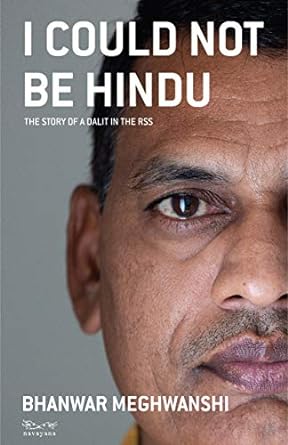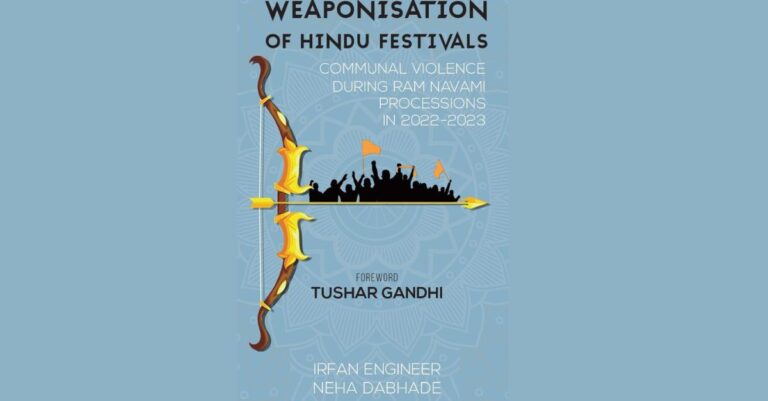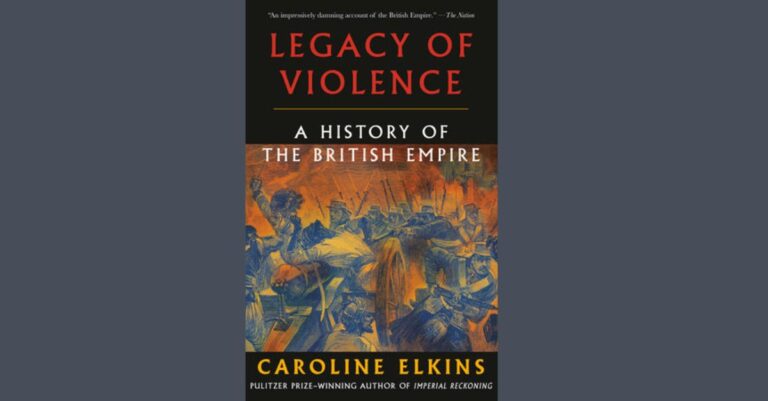I Could Not Be Hindu : The Story of a Dalit in the RSS
Bhanwar Meghwanshi
Navayana (2020)
Paperback
Page: 240
Rs. 300/-

Rarely does one come across a memoir, which is simultaneously crisp, profound, poignant, and rigorous. I could not be Hindu is such a memoir by Bhanwar Meghwanshi, who hails from a weaving community deemed untouchable by the Hindu society.
This memoir is the story of his evolution from an innocent child to a mature middle-aged man— an evolution that very few people can make. Reading this memoir, I realised the richness of the Dalit lifeworld, which, when articulated, makes a captivating narrative. Before discovering this book, I had a rudimentary understanding of the caste order in the Hindu society and the increasing menace of Hindu communalism engulfing India.
This memoir helped me to further refine my views on these two topics. There is one more thing that I learnt after reading this book, that is, what can be broadly called as ‘Ambedkarism’. What should govern our day-to-day conduct? How to live life peacefully and blissfully? What should be our relation to the world outside and the soul within? It is this aspect of the memoir that won over my heart. That innocent, unsuspecting child, after having a life-changing experience, comes out as a better person, not a bitter person. This memoir is about having one’s soul cleansed and mind refreshed.
As a child, Bhanwar Meghwanshi started to attend RSS shakhas primarily to play with children of his age. The Rashtriya Syamsewak Sangh (RSS) is a Hindu cultural organisation that promotes Hinduism in public but Brahmanism in private. There they received some training in games and elementary lessons in moral conduct. Over time, he became attached to the ethos of the RSS and attended shakhas religiously. As he entered adulthood, his father sensed trouble and advised him to look beyond the cultural facade of the RSS. His father foretold that the RSS was normalising untouchability and caste hierarchy under the guise of Hindu culture and rituals. Meghwanshi was surprised to hear his father’s views and felt that his father also suffered from the disease of secularism!
Meghwanshi, however, kept on attending shakhas, imbibing all the values taught there. Initially, he was given minor roles, but in due course, he was entrusted with serious responsibilities. Soon, ‘one nation, one religion’ became his motto in life, and he committed himself to die for this ideal to actualise.
It was only when he experienced untouchability from the people he trusted that Meghwanshi started to deeply ponder over the RSS. What would a Hindu India look like? Would ‘one nation, one religion’ also accept just one caste? These questions began engulfing his thoughts, leading him to contemplate leaving this world due to depression. The day he realised that no matter how hard he tried, he would remain an untouchable, his illusion of a Hindu rashtra disappeared.
For him, Ambedkarism emerged as the ideal alternative, embodying a philosophy of life where people interact with each other as brothers and sisters. He was impressed by the humanitarian concern and warmth shown to him by members of religious minorities. He came to understand that Muslims and Christians are not foreigners but fellow Indians. He recognised that all minorities, whether they be Dalits, Adivasis, Sikhs or Buddhists, are an integral part of India. Hindu supremacists are against the very idea of India as proposed by B.R. Ambedkar and Jawaharlal Nehru.
This memoir takes you to the villages of Rajasthan, into the houses of poor karyakartas, and to the rich but hypocritical Hindutva supporters. It tells you about the poverty in government-sponsored hostels for Dalits and Adivasis, about the rage of frustrated youths of VHP and Bajrang Dal, and about the planners of pogroms and killings.
However, this book is not all blood and fury, rage and arson, killings and crimes. We find Meghwanshi seeking mental peace outside, but finally finding it inside. Returning home much wiser, he became an admirer of his father’s wisdom. This long and painful journey is filled with a lot of events and people; friends and foes; strangers and acquaintances. Yet the profound influence of Buddhism, Saint Kabir and Sufism on Meghwanshi is evident.
Towards the end, he got his calling: it was the call of love; love for humanity. Away from the commotion of RSS goons, he found his peace of mind. Now he wanted a nation as envisaged by B.R. Ambedkar– a nation founded on equality, liberty and fraternity.
The memoir elaborates in detail on how the essence of Hindu communalism is social exclusion, while the essence of Ambedkarism lies in social inclusion. Social inclusion encompasses inclusion across caste, class, religion, region and gender. However, references to B.R. Ambedkar’s writings on these themes are missing from this book. For example, Communal Deadlock and a Way to Solve it (1945) is a masterpiece discussing Hindu communalism, and States and Minorities (1947) elaborates on the importance of a socialist economy and the protection of religious minorities like Muslims, Christians and Sikhs.
The memoir also omits references to why B.R. Ambedkar wanted Dalits to be recognised as non-Hindus for their self-respect. Furthermore, it does not mention the resignation of B.R. Ambedkar over the controversial Hindu Code Bills and his commitment to gender justice. To this day, dominant caste Hindu men oppose inter-community marriages and call it a matter of honour!
Nonetheless, the book deserves to be read by all those who want a bird’s-eye view of Hindu society in Rajasthan.
Originally written in Hindi, its translation into English is a welcome move. This story deserves attention by people across the oceans; it is a story of inspiration, determination and motivation.




